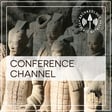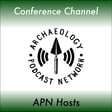Become a Creator today!Start creating today - Share your story with the world!
Start for free
00:00:00
00:00:01

062 - CIFA2018 - Rob Lennox
Rob Lennox is the policy advisor to the Chartered Institute for Archaeologists (CIfA) and in this interview we discuss the challenges for archaeology as a profession and the ways in which conferences such as CIFA held in Brighton this year can bring people inside and outside the industry together to work together.
Recommended
Transcript
Introduction of Justin and Rob Lennox
00:00:01
Speaker
You're listening to the Archaeology Podcast Network. Hi, this is Justin here, speaking for the Archaeology Podcast Network. Across the table from me is Rob Lennox. I am Policy and Communications Advisor for the Chartered Institute for Archaeologists.
00:00:23
Speaker
Wonderful. So this
Value of the SIFA Conference
00:00:25
Speaker
is a SIFA event and this is a SIFA world, so to speak. This conference has been really actually quite cool. Is there anything that stands out to you? Are the conversations you've had that really, for you, sums up what this conference seems to be about?
00:00:41
Speaker
Oh, interesting question. Yeah, I mean, I think I've been a SIFA member of staff for a couple of years. So I think probably my third conference as a member of SIFA staff, and I've attended several before that since arriving into the profession of archaeology. And I think being a SIFA member of staff at SIFA conference is a really, well, one of the most valuable
00:01:10
Speaker
opportunities that I have, particularly someone who doesn't have a background in archaeology explicitly, to meet a variety of people from our rows, from different specialisms, as well as all of the great stuff that happens in the session. So I think that's what's really valuable for me is understanding the breadth of the profession, which I get from being here at conference and speaking to people.
Bridging Academic and Commercial Archaeology
00:01:36
Speaker
There are a lot of questions to be had within archaeology as a whole and it's often difficult to see what the answers are. How do you think we can move forward when it comes to bridging the gap between academic archaeology and commercial archaeology? Is there a gap there or is that gap kind of in our minds?
00:01:59
Speaker
I'm a doctor, I've got my PhD from the University of York. I consider myself to be an academic. I am also working for the Professional Institute in an advocacy capacity, working to influence government on behalf of commercial archaeologists and the wider profession.
00:02:25
Speaker
Yes, I think there is a gap. But I don't think it is total. I think that there are a number of academic archaeologists here at the conference. There's a lot of people who have academic roots. I continue to at least have an aspiration to publish, even if it's perhaps not as quick as I'd like it to be.
00:02:51
Speaker
And I think that this conference has much more to offer academics than perhaps there is a perception of. And so actually the conference, I would like to think that this is a great space for that divide to be bridged. And indeed our session today was focused on that precisely as one of the key issues. That was the reconnecting archaeology one, wasn't it?
00:03:22
Speaker
Was there anything else that highlighted that? What were the conversations like? Is there any particular thing that really just stood out as an example?
Key Papers on Archaeology Challenges and Opportunities
00:03:32
Speaker
I thought the session went really well. I think there were a couple of standout papers for me and that's with the second half of the session where people sitting at the back of the room listening to Neil Redfern from Historic England are giving his personal reflections on the post-PPG 16 world of development-led archaeology
00:03:57
Speaker
and how that has almost become a straitjacket for us as a sector in defining what we do and what we're limited in doing. And I think that is an extremely valuable thing to be exploring as we look towards the next 25 years for the archaeology sector.
00:04:20
Speaker
Particularly if you think about what was happening in the late 80s in the UK before PPG-16, before we had a true commercial archaeology sector as we take for granted now, people were thinking about how to overcome the problems that the sector faced or that the discipline faced in the era of rescue archaeology.
00:04:46
Speaker
We might be looking down the barrel of a change to the paradigm in the next 20 years, probably. As Neil was saying and as Mark Spania was saying in the session as well, the law isn't absolutely changes and policy changes and situations change. And I think what we need to be doing as a sector is finding a vehicle through which we can define what's next
00:05:14
Speaker
So I've had some really interesting conversations about what that might be, whether there is to be a change to development-led archaeology. Could we have, instead of a developer playing to the archaeology, political plays for their own sites, could there be a levy system for all developers?
00:05:36
Speaker
that confirm any kind of archaeology. That's an interesting idea that could be explored. It would give us interesting opportunities to talk about public benefit and the wider ranges of things. Something else brilliant from this conference from yesterday was Jenny Williams' paper in the Who's Archaeology session.
00:05:54
Speaker
Absolutely fantastic emotional paper about how to connect with diverse audiences and some of the anecdotes you told were fantastic. We're not enabling those through the current system and I think that it's important that we have the vehicle to talk about how we do that better.
00:06:16
Speaker
I just
SIFA's Role in Archaeological Policy and Legislation
00:06:17
Speaker
want to finally and quickly talk very briefly about you were saying about policy and how the legislation can change. It was commented on in the opening address that SIFA was being criticized for drawing undue attention to heritage.
00:06:36
Speaker
And I just want to know what does SIFA do when it comes to fighting our corner? Because let's be honest here, we have to fight that corner. I think that's one of the things that's been very apparent to me throughout this whole conference is we need to define our purpose and we need to really stop navel gazing, in my opinion, and we need to really fight for the right
00:06:58
Speaker
to dig. What is SIFA doing in that regard to policy? Because we're obviously doing the right thing if we're getting blamed for it. A core part of SIFA's role is to represent the archaeology and the archaeology sector to government and to other stakeholders, whether they be the client sectors, other national bodies, the other professional institutes.
00:07:28
Speaker
and we do this every day of the week. Virtually we write briefings, politicians, we provide consultation responses, we're working behind the scenes with personal contacts of the government and other organisations to put our concerns across and to provide evidence that shows how and why we think that archaeology should be protected by the law.
00:07:51
Speaker
by policy, how we can contribute to agendas as wide as planning reform, health and wellbeing, and all of those things, SIFA has a responsibility to do for the sector. I think what my colleague Tim Howard was saying in the opening address about undue attention being brought to archaeology, I think that he was trying to say that as a
00:08:15
Speaker
I just praise for what we do, i.e. when we talk about planning reform, archaeology is a very small part of the planning process. And yet, when we speak as a sector through CIFAR and through other organisations,
00:08:31
Speaker
we get quite a lot of support, shall we say, so he may have been referring to specific instances where we've been able to generate a lot of response from the sector over the last 18 months.
00:08:46
Speaker
A recent rescue letter about the potential to impact environmental principles after Brexit gained a lot of publicity for certain discussions in Parliament.
00:09:02
Speaker
In the previous year we did the same. Members of the archaeological community standing up to say this is really important and SIFA going in above those members of the profession to speak to government and to make sure that we do our very best to protect what we've got and seek new opportunities to do things better. Thank you very much.
00:09:30
Speaker
This has been a presentation of the Archaeology Podcast Network. Visit us on the web for show notes and other podcasts at www.archpodnet.com. Contact us at chrisatarchaeologypodcastnetwork.com.

